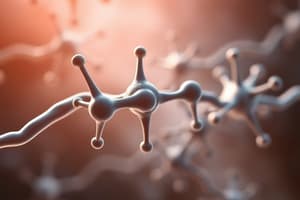Podcast
Questions and Answers
What is the mechanism whereby drugs exert their effect on the body?
What is the mechanism whereby drugs exert their effect on the body?
- Metabolism
- Pharmacokinetics
- Pharmacodynamics (correct)
- Drug administration
Which of the following best describes the difference between drug action and drug effect?
Which of the following best describes the difference between drug action and drug effect?
- Action is the therapeutic outcome, while effect is the mechanism of action.
- Effect is the alteration of the condition that brings about action.
- Action and effect are terms that can be used interchangeably.
- Action precedes effect; effect is the result of action. (correct)
Which type of drugs work through physical mechanisms?
Which type of drugs work through physical mechanisms?
- Drugs acting on receptors
- Chelating agents
- Enzyme inhibitors
- Osmotic laxatives (correct)
What class of drugs primarily act on biological catalysts in the body?
What class of drugs primarily act on biological catalysts in the body?
In pharmacology, what remains unchanged at the conclusion of a reaction involving enzymes?
In pharmacology, what remains unchanged at the conclusion of a reaction involving enzymes?
Which type of drugs are relatively or completely specific for certain substrates?
Which type of drugs are relatively or completely specific for certain substrates?
When two drugs with the same effect are given together, producing a drug effect that is greater in magnitude than the sum of the individual effects of the two drugs, it is an example of:
When two drugs with the same effect are given together, producing a drug effect that is greater in magnitude than the sum of the individual effects of the two drugs, it is an example of:
Which of the following drug combinations results in increased sedation or CNS depression?
Which of the following drug combinations results in increased sedation or CNS depression?
Potentiation occurs when:
Potentiation occurs when:
Which drug combination results in increased hypoglycemic effects?
Which drug combination results in increased hypoglycemic effects?
What type of drug interaction is seen when one drug, lacking an effect of its own, increases the effect of another active drug?
What type of drug interaction is seen when one drug, lacking an effect of its own, increases the effect of another active drug?
Which drug combination causes increased negative inotropic & chronotropic effects?
Which drug combination causes increased negative inotropic & chronotropic effects?
Which theory postulates a complementary relationship between the drug molecule and its active site?
Which theory postulates a complementary relationship between the drug molecule and its active site?
In receptor theories, what is the function of an antagonist drug?
In receptor theories, what is the function of an antagonist drug?
What attribute of a drug is the measure of the equilibrium constant of the drug-receptor interaction in classical occupation theory?
What attribute of a drug is the measure of the equilibrium constant of the drug-receptor interaction in classical occupation theory?
Which type of drug can elicit some but not a maximal effect and antagonize an agonist according to the occupation theory?
Which type of drug can elicit some but not a maximal effect and antagonize an agonist according to the occupation theory?
What is the main requirement for a drug to have its maximum effect according to Clark's Hypothesis?
What is the main requirement for a drug to have its maximum effect according to Clark's Hypothesis?
Which theory emphasizes that the drug molecule must specifically 'fit into' a receptor to induce a response?
Which theory emphasizes that the drug molecule must specifically 'fit into' a receptor to induce a response?
Flashcards are hidden until you start studying




